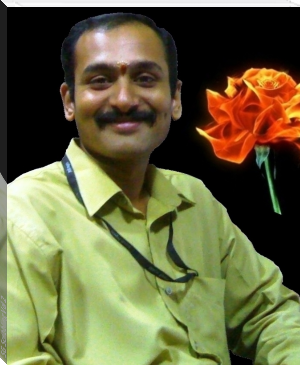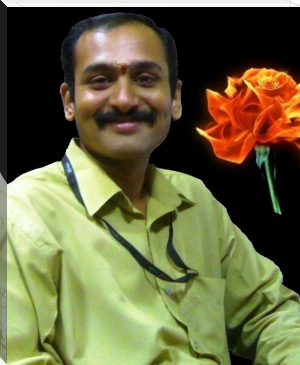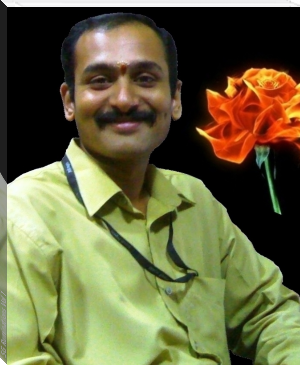SG Scribbling Vol 2, Sabari Ganesh [e reader comics .TXT] 📗

- Author: Sabari Ganesh
Book online «SG Scribbling Vol 2, Sabari Ganesh [e reader comics .TXT] 📗». Author Sabari Ganesh
GOD
© Sabari Ganesh; “All Rights Reserved”
authorsabariganesh@gmail.com
https://sabariganesh23.sarahah.com
GOD is ONE; GOD is in EVERYONE!
GOOD is GOD; GOD is in GOOD!!
GOD transcends GOOD!!!
The essence of Adwaitham. However, Dwaitham is more explicit in the materialistic plane of activity. Dwaitham postulates the existence of GOD as a separate and unique entity, so very different from any other. Also, the supremacy of GOD is unquestioned and unchallenged by the common man. It has been a universal perception that temples, mosques and churches are the abode of GOD; hence the pilgrimage that every theist undertake in their life time - either to Mecca, or Jerusalem or any other. However, history evidence that the various forms of GOD that we worship today are actually the divinity of human incarnations!
Brahma, Vishnu and Shiva are the trinity and primordial energy that form the essence of this materialistic universe. Sanath Kumar is the psychic son of Brahma. He is ever transfixed in the non-duality of the Aathma. However, once he envisioned a dream. In the dream, he visualised himself leading the army of Devas; destroying Raakshasaas. Sanath Kumar was surprised at this dream; primarily due to two reasons. When a person is transfixed in Aathma, how can there be a separate entity called Dream? Also, the dream personified his being good and destroying evil - indicating duality - Dwaitham.
Upon enquiry, Brahma revealed the earlier incarnation of Sanath Kumar as the one learned and adept in the Veda. Devas are the presiding deities of the vedic fire rituals performed for the welfare of the world; Raakshasaas are those that aim to destroy the good effects of it. The narration of the war between Devas and Raakshasaas got imprinted in his mind that he became furious and determined to head the army of the Devas and annihilate the Raakshasaas. Brahma spelled out, it is this particular determination of his earlier birth that is indicated as dream; however, as he is transfixed in the non-duality of the Aathma in this life called Sanath Kumar, the dream shall manifest in his succeeding birth!
Sanath Kumar, ever engrossed in the Aathma, could only ignore this dream. When a person is engaged in truth all along his life; gains an unintentional capability that whatever he utters shall manifest. Hence, the master of the Universe, Shiva had to take up the responsibility of fulfilling Sanath Kumar's dream. He, along with his consort Parvathi appeared before Sanath Kumar, even without being invoked; only to be ignored by him in the worldly parlance! A person stops reacting, the moment one gets stabilised in Adwaitham; as there is no separate entity other than oneself.
Shiva was elated at the stature of Sanath Kumar. However, in an effort to test him threatened of the consequence arising out of his anger and curse, as he has been ignored. Sanath Kumar in a composed manner replied that no curse however powerful it may be; can harm the Aathma - that one is! Shiva, happy with this response, now tried to seduce Sanath Kumar with his offer of a boon. Sanath Kumar citing the futility of any boon for one who is ever in supreme bliss; hinted that it is Shiva who seem to be interested in boon and curse, hence offered to give him a boon!
Shiva, seizing this opportunity to fulfil the dream of Sanath Kumar, supplicated him to be born as his son; for which Sanath Kumar agreed. However, he intimated Shiva that it is laid down in the sastras that nothing should be given unasked. Since he alone secured the boon, Shiva singularly might create a conducive situation for Sanath Kumar to take a form. Parvathi, shocked and saddened at being deprived of the good fortune demanded equal rights in the results of her husband's efforts. However Sanath Kumar negated her stance stating that he does not wish to accept a body that’s been formed out of connubial union and vaginal birth. After much debate, both Sanath Kumar and Parvathi compromised.
Earlier, Shiva vanished in thin air, when Bhasmasura threatened him with the boon obtained from Shiva himself. Parvathi, who at that instance was in the pretence of an ordinary lady, unable to tolerate the separation from her husband, psychologically melted in sorrow and fright. Her mortal frame that melted in reality formed a lake called Saravanam. After Bhasmasura was destroyed by the Mohini incarnation of Vishnu; Shiva appeared again. Parvathi too assumed her mortal frame but the lake remained. Parvathi and Sanath Kumar agreed that the life force emanated by Shiva shall be borne by the Lake Saravanam, which is the manifestation of her mortal frame.
As agreed upon, when Shiva emanated his élan vital, the Aathma of Sanath Kumar ascended. Ganga carried it to lake Saravanam and lo emerged sextuple unified by Parvathi to be called Kandan. Since he emerged out of the lake Saravanam - the mortal personification of Parvathi, he is called Saravanan. Even today, the main mantra to invoke him is 'Saravana Bhava'.
Since the virility of Shiva is Agni; Kandan is invoked as the presiding deity of every fire ritual performed as ordained by Dharmasastra. The traditional worship of every Hindu is the Panchayatana Puja. It is supplication to five vital forms of the same divinity. They are Ganesh - Ganapathyam, Sun - Sowram, Mahavishnu - Vaishnavam, Parvathi - Saaktham, Shiva - Saivam. Adding to this; Sri Adisankara invigorated the worship of Muruga terming it as Gowmaaram. Hence, Muruga is not mere the local deity of the thamizh speaking sect but a vedic incarnation.
Our thoughts determine our birth. The inherent wisdom of the Vedic scholar and the merits accumulated by ardent learning and practice of the Veda, resulted in the succeeding birth as Sanath Kumar, son of Brahma. Brahma is a Brahmin who is an exponent in the practical application of the Veda. His advocacy of the Veda is of the superlative stature to the extent of reciting all the four Vedas at the same instance. The objective and focus of Veda is self-realisation - Adwaitham - precisely the state of Sanath Kumar. The unintentional merit of Sanath Kumar remaining transfixed in the non-duality of the Aathma, coupled with his earlier determination to annihilate the Rakshasas gained him the stature, son of Shiva - the highest of the trinity. The inherent beauty is characterised by the beneficiary being the donor of the boon!
The other incarnations are Thirugnanasambandhar and Kumarilapattar. Santhokya Upanishad details that Sanath Kumar, Guru of Devarishi Narada is Saravanan, who assumed the role of Shiva's Guru; hence called Swaminathan. Of all the incarnations of the Aathma - The Vedic Scholar, Sanath Kumar, Saravanan, Thirugnanasambandhar and Kumarilapattar; Saravanan touches the peak of divinity. The celestial peak of human's divinity is revered GOD.
Future of WTOFuture of WTO
© Sabari Ganesh; “All Rights Reserved”
authorsabariganesh@gmail.com
https://sabariganesh23.sarahah.com
The World Trade Organisation (WTO) was established on January 1, 1995 with the sole prime objective of promoting free and fair trade among nations of the world. The multilateral trade discussions among member nations play a pivotal role in advancing towards a better free trade regime. The success of these trade talks therefore is a critical element of progress. Over the past twenty years, and a series of multilateral trade talks; free trade in totality is still a dream.
The basic idea of free trade among nations is to provide a level playing ground for companies to compete. The objective is the betterment and enrichment of human life irrespective of any distinction based on geography, race or sect etc. The competition is intended to be based on competencies and merit alone. A level playing ground shall be a reality only when it is ensured that competition is ethical and among equals. However, the members of WTO stand segregated based on their economic health; as developed, developing and backward nations.
The most powerful logic that blocks WTO from achieving the free trade regime in totality is the innate need and urge of its member nations to protect their domestic industry. The propellant of such an idea is the negative impact of free trade on the weaker sections of the participants. The focus and efforts of WTO has so long fallen short to escalate and strengthen its members as equals on every possible parameter. The intent of the member nations too is selfish to the extent of benefitting from the free trade regime without yielding on their present protectionist measures.
The prime contention among the developed and developing nations are on three aspects - Agriculture, Services and Manufacturing. The sophisticated technology of the developed countries is a threat to the developing countries that would eventually annihilate their domestic industries. The developing nations pose a serious threat to the employment scenario of its developed counterparts with its comparatively low cost technically skilled manpower; which over a period of time would have a devastating effect on the economy of the developed countries. The subsidies granted by the governments of the developed nations challenges the level playing field; so as the protectionist measures and customs procedures of the developing nations.
Also, the WTO is witnessing a major change in its composition mix since its inception. The members belonging to the category of developing nations are on the rise; hence their voice and demand. The dominance of the developed countries; especially that of the US and EU is challenged at the discussion table of trade talks. The present scenario witnessing the dwindling economies of the developed countries and the relatively stable economies of the developing countries has enabled the WTO operate more as an independent body than a puppet of the US and EU.
Free trade shall become a practical reality when the competing grounds become flat and even for all the member nations. Twenty years for an organisation with such a massive objective is infancy. Levelling the competing grounds needs strategic intent and segmented focus. The blurring of consensus of the trade talks may be attributed to the vastness of the scope and spread of the focus taken up for discussions; given the economic diversity of the member nations and their protectionist attitude.
The rise of India and China as a prominent representative of the developing countries is a healthy sign of balancing the WTO weigh scale. As the popular analogy dictates that water finds its level, effectively loses its crest and trough at the same instance. The stalemate of





Comments (0)